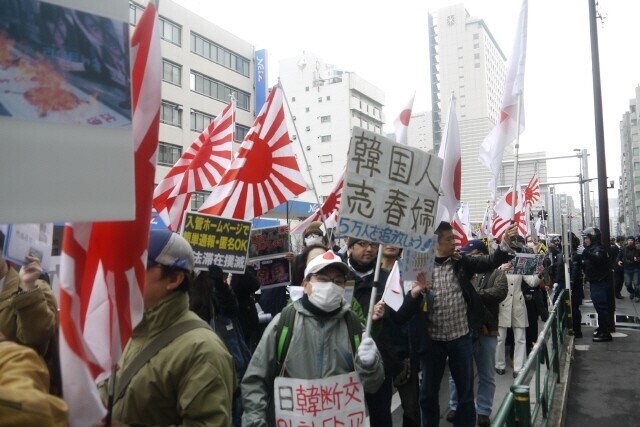hankyoreh
Links to other country sites 다른 나라 사이트 링크
The rise of anti-Korean sentiment and hate speech in Japan

Anti-Korean sentiment in Japan is spreading beyond far-right groups and into Japanese companies. While this is closely connected with a general rightward shift in Japanese society, some argue that it has resulted from the lack of significant legal sanctions against hate speech in the country.
Amid the rise of hate speech in Japan, not only the central government but also the cities of Tokyo, Osaka, and Kobe have created laws and regulations banning it. But despite a show of taking action against hate speech, few of those regulations mandate actual punishment. One exception is the city of Kawasaki, which enacted a new rule on July 1 that will mete out fines of up to 500,000 yen (US$4,660) for hate speech.
The result is that cases take a long time and only end in a slap on the wrist, even when victims of hate speech press charges. For example, it took a full five years for a district court to reach a verdict, on July 2, in a damages lawsuit filed against real estate firm Fuji Corporation for hate speech violations. (See July 13 edition of the Hankyoreh for more.) Furthermore, the victim was only awarded 1.1 million yen (US$10,252) in damages, despite asking for 33 million yen (US$307,552).
That punishment is extremely mild in light of the behavior of Fuji Corporation, which distributed documents within the company for two and a half years, beginning in 2013, describing Koreans as “an ethnic group marked by pervasive lying” and saying that “Zainichi [ethnic Koreans in Japan] should die.” The plaintiffs’ legal team said that “the amount awarded is too small given the severity of the suffering inflicted.”
Even passing around anti-Korean “fake news,” such as claims that Chosen Gakko (schools affiliated with North Korea) are “spy training centers,” only leads to a fine of a few hundred thousand yen. Despite being convicted of criminal defamation for such remarks, Hitoshi Nishimura, a former senior member of the Zaitokukai far-right organization, was only fined 500,000 yen (US$4,660) in November 2019.
In August of last year, at a time of high tensions between South Korea and Japan, guests on DHC television, an online broadcast produced by Japanese cosmetics company DHC, referred to Koreans by the pejorative term “Chosenjin” and even made the absurd claim that modern hangul (the Korean writing system) was put together by the Japanese.
In 2016, DHC Chairman Yoshiaki Yoshida also posted derogatory statements about Koreans living in Japan on the company website. Perhaps influenced by the chairman’s personal views, DHC television rejected accusations of anti-Korean sentiment and claimed in an official statement that its guests’ comments were “grounded in the facts.”
The APA chain of hotels, which operates more than 60 properties in Tokyo alone, stocks its guest rooms with books that deny the Rape of Nanjing and the sexual servitude of the comfort women. The books — which are even sold at the front desk —were written by Toshio Motoya, president of the APA Group, but the company hasn’t been sued or confronted with any criminal charges.
In 2018, the UN Committee on the Elimination of Racial Discrimination noted that discriminatory speech against Koreans has continued even after Japan enacted laws against hate speech and called on the Japanese government to take sterner action. But Tokyo has apparently ignored those calls.
Discrimination threatens livelihood of ethnic Koreans in JapanThe overt anti-Korean mood in Japan and the Japanese government’s tolerance of such behavior is threatening the livelihood of ethnic Koreans in Japan.
“I regard hate speech not as an ideological issue but as a deadly weapon that imposes discrimination on people in a vulnerable position,” said Korean-Japanese writer Ushio Fukazawa in a recent interview with the Asahi Shimbun, a Japanese newspaper. When a Japanese weekly magazine ran a hateful article about Korea, Fukazawa protested by halting a regular column she’d been writing for the magazine.
By Kim So-youn, staff reporter
Please direct comments or questions to [english@hani.co.kr]

Editorial・opinion
![[Column] Park Geun-hye déjà vu in Yoon Suk-yeol [Column] Park Geun-hye déjà vu in Yoon Suk-yeol](https://flexible.img.hani.co.kr/flexible/normal/500/300/imgdb/original/2024/0424/651713945113788.jpg) [Column] Park Geun-hye déjà vu in Yoon Suk-yeol
[Column] Park Geun-hye déjà vu in Yoon Suk-yeol![[Editorial] New weight of N. Korea’s nuclear threats makes dialogue all the more urgent [Editorial] New weight of N. Korea’s nuclear threats makes dialogue all the more urgent](https://flexible.img.hani.co.kr/flexible/normal/500/300/imgdb/original/2024/0424/7317139454662664.jpg) [Editorial] New weight of N. Korea’s nuclear threats makes dialogue all the more urgent
[Editorial] New weight of N. Korea’s nuclear threats makes dialogue all the more urgent- [Guest essay] The real reason Korea’s new right wants to dub Rhee a founding father
- [Column] ‘Choson’: Is it time we start referring to N. Korea in its own terms?
- [Editorial] Japan’s rewriting of history with Korea has gone too far
- [Column] The president’s questionable capacity for dialogue
- [Column] Are chaebol firms just pizza pies for families to divvy up as they please?
- [Column] Has Korea, too, crossed the Rubicon on China?
- [Correspondent’s column] In Japan’s alliance with US, echoes of its past alliances with UK
- [Editorial] Does Yoon think the Korean public is wrong?
Most viewed articles
- 1[Column] Park Geun-hye déjà vu in Yoon Suk-yeol
- 2Thursday to mark start of resignations by senior doctors amid standoff with government
- 3N. Korean hackers breached 10 defense contractors in South for months, police say
- 4Kim Jong-un expressed ‘satisfaction’ with nuclear counterstrike drill directed at South
- 5[Editorial] New weight of N. Korea’s nuclear threats makes dialogue all the more urgent
- 6Will NewJeans end up collateral damage in internal feud at K-pop juggernaut Hybe?
- 7[Column] ‘Choson’: Is it time we start referring to N. Korea in its own terms?
- 8[Editorial] Japan’s rewriting of history with Korea has gone too far
- 9[Cine feature] A new shift in the Korean film investment and distribution market
- 10[Column] The president’s questionable capacity for dialogue